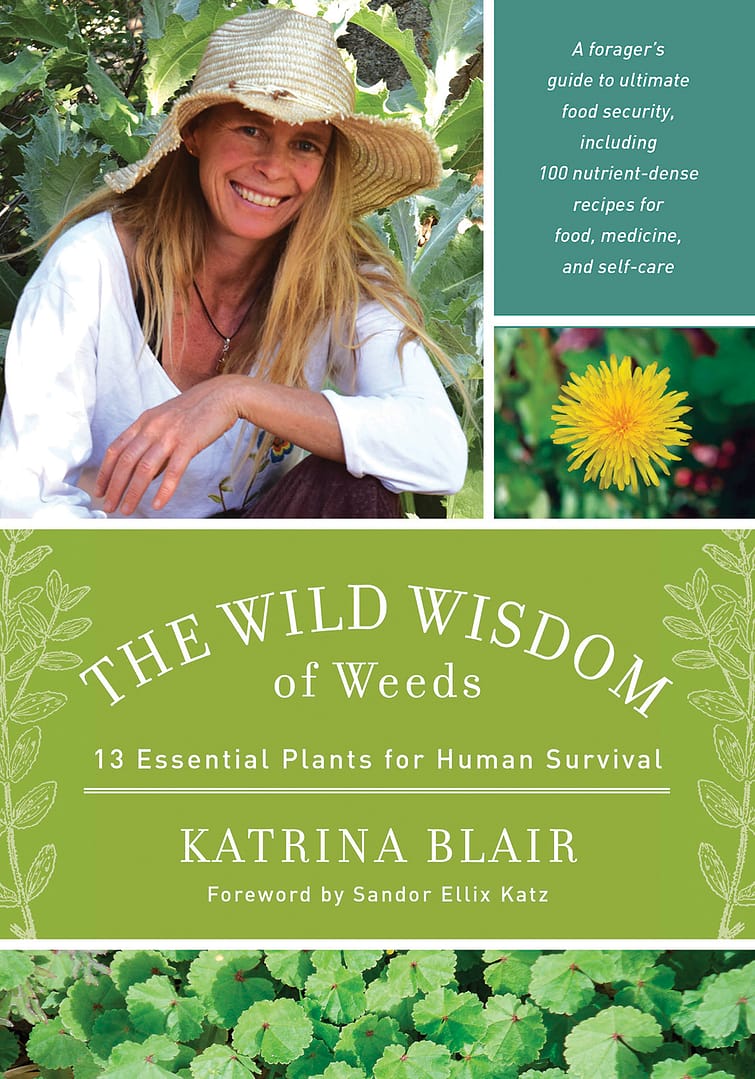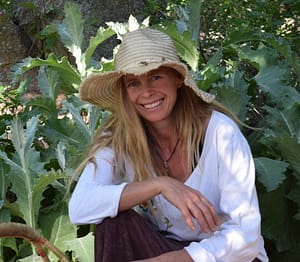| Pages: | 384 pages |
| Book Art: | Color photos and illustrations throughout |
| Size: | 7 x 10 inch |
| Publisher: | Chelsea Green Publishing |
| Pub. Date: | October 7, 2014 |
| ISBN: | 9781603585163 |
The Wild Wisdom of Weeds
13 Essential Plants for Human Survival
Paperback
$34.95
The Wild Wisdom of Weeds is the only book on foraging and edible weeds to focus on the thirteen weeds found all over the world, each of which represents a complete food source and extensive medical pharmacy and first-aid kit. More than just a field guide to wild edibles, it is a global plan for human survival.
When Katrina Blair was eleven she had a life-changing experience where wild plants spoke to her, beckoning her to become a champion of their cause. Since then she has spent months on end taking walkabouts in the wild, eating nothing but what she forages, and has become a wild-foods advocate, community activist, gardener, and chef, teaching and presenting internationally about foraging and the healthful lifestyle it promotes.
Katrina Blair’s philosophy in The Wild Wisdom of Weeds is sobering, realistic, and ultimately optimistic. If we can open our eyes to see the wisdom found in these weeds right under our noses, instead of trying to eradicate an “invasive,” we will achieve true food security. The Wild Wisdom of Weeds is about healing ourselves both in body and in spirit, in an age where technology, commodity agriculture, and processed foods dictate the terms of our intelligence. But if we can become familiar with these thirteen edible survival weeds found all over the world, we will never go hungry, and we will become closer to our own wild human instincts—all the while enjoying the freshest, wildest, and most nutritious food there is. For free!
The thirteen plants found growing in every region across the world are: dandelion, mallow, purslane, plantain, thistle, amaranth, dock, mustard, grass, chickweed, clover, lambsquarter, and knotweed. These special plants contribute to the regeneration of the earth while supporting the survival of our human species; they grow everywhere where human civilization exists, from the hottest deserts to the Arctic Circle, following the path of human disturbance. Indeed, the more humans disturb the earth and put our food supply at risk, the more these thirteen plants proliferate. It’s a survival plan for the ages.
Including over one hundred unique recipes, Katrina Blair’s book teaches us how to prepare these wild plants from root to seed in soups, salads, slaws, crackers, pestos, seed breads, and seed butters; cereals, green powders, sauerkrauts, smoothies, and milks; first-aid concoctions such as tinctures, teas, salves, and soothers; self-care/beauty products including shampoo, mouthwash, toothpaste (and brush), face masks; and a lot more. Whether readers are based at home or traveling, this book aims to empower individuals to maintain a state of optimal health with minimal cost and effort.
Reviews and Praise
Library Journal–
"When you encounter a weed, do you pull it, spray it—or consume it? Blair, a holistic health and sustainable living educator, recommends the latter. In the first few chapters of this title, she emphasizes the importance of wild plants as food and medicine. The remaining chapters profile 13 edible weeds commonly found worldwide near human habitations: amaranth, chickweed, clover, dandelion, dock, grass, knotweed, lambsquarter, mallow, mustard, plantain, purslane, and thistle. Many are frequently classified as noxious or invasive, but Blair encourages us to see them not as enemies to be eradicated but as allies to nourish body and spirit. Each profile includes botanical and common names, a description, photos, history, edible and medicinal uses, and recipes. All recipes are vegan and most are raw. Verdict: This book includes valuable information about identifying and using common weeds and encourages us to reconsider our relationship with these usually scorned plants.”
More Reviews and Praise
The New York Times-
“How do we learn to empathize with other creatures, to respect the web of life that connects us all? The answer must lie, at least in part, somewhere in the deeply pleasurable childhood experiences so many gardeners cherish, moments of gazing into the depths of a blossom or watching a tendril unfold — and falling under the spell of a tiny miracle. … Katrina Blair’s charming and intelligent The Wild Wisdom of Weeds … delivers just about the best argument I’ve read for the futility of figuring out what, exactly, qualifies as a native plant and why ‘invasive’ can be a flawed concept. …Weeds, she insists, are ‘examples of nature’s creative edge.’ They’re powerful ambassadors, here to support our quality of life.”
"For more than a decade, I have been learning about the outstanding value of common weeds as survival food, as free and natural “live" foods with nutritive values far exceeding those of store-bought greens, and as sources of natural medicines to help restore health to bodies robbed of their vitality by the toxins, stresses, and poor diets of our modern world. There are thousands of wild edible plants on our planet, most of which are unpleasant to eat and difficult to locate or identify. Many of us wonder where and how we might best begin to learn to find and use these wild edibles. Katrina Blair's The Wild Wisdom of Weeds is the perfect handbook for taking this journey back to better health, vitality, food security, and peace of mind, by learning to collect and use thirteen common nutritious and delicious wild weeds that grow pretty much everywhere that people live. It is a fantastic resource, and I highly recommend it! "--Matthew Stein, author of When Disaster Strikes and When Technology Fails
"Required reading for the survival of our species! What can we do to live more sanely in an increasingly insane world? Katrina Blair offers a new world of possibilities. The myriad brilliant insights and pragmatic solutions within The Wild Wisdom of Weeds are essential and evolutionary.”--Happy Oasis, Adventure Anthropologist, founder of Bliss U and the Raw Spirit Festival
"The Wild Wisdom of Weeds provides a beautiful and empowering exploration of wild foods, helping you to identify, prepare and celebrate edible weeds that you might otherwise overlook with simple tips on medicinal use, and charming, nutrient-dense recipes. A must-have for any beginning or serious forager.”--Jennifer McGruther, author of The Nourished Kitchen
"This may be the most important book you will ever read. Far more than just a book about foraging; it offers, with comforting clarity, hope for the future of feeding the world when before there seemed to be none.”--Nomi Shannon, RawGourmet.com
"This is the kind of information that should precede gardening and farming. Katrina Blair expertly shows that before picking up a hoe or spreading a single seed, we can turn to our yards, fields and forests for so many of the foods and medicines we need to live well. The Wild Wisdom of Weeds is a gem, and will be foundational reading for anyone wanting to live close to the goodness of this Earth.”--Ben Falk, author of The Resilient Farm and Homestead
“Katrina Blair keeps it really simple and approachable..her recipes have inspired me to experiment with new ingredients in my ferments.”--Sandor Ellix Katz, author of The Art of Fermentation, from the foreword
"Common weeds can be even more nutritious and medicinal than our favorite vegetables. Three cheers to Katrina Blair for sharing the depths of such friends as lambsquarter and purslane! Release your inner goat and go graze. Use these fantastic recipes to become an inspired gourmet of wild things. This book radiates with thorough research and first-hand knowledge of plants that matter.”--Michael and Nancy Phillips, authors of The Herbalist’s Way and The Holistic Orchard
“The Wild Wisdom of Weeds is one of those rare and important books that has the capacity to radically alter your view of a world you thought you knew well. You'll never look at weeds the same again!”--Ben Hewitt, author of The Nourishing Homestead and The Town that Food Saved
"Covering a small number of the most common edible/medicinal plants in depth, The Wild Wisdom of Weeds offers information on these species and their close relatives from multiple perspectives. From identification, harvesting and uses, through personal experiences and philosophy, to science and mysticism, this book has it all. Wherever in the world you live, whether you're a beginner or experienced forager, you'll have lots of fun reading and using this book.”--"Wildman" Steve Brill, naturalist, and author of the foraging app Wild Edibles
"Weeds used to be something you kill, eradicate, make war on, get rid of. But weeds are the plants that thrive, and The Wild Wisdom of Weeds is a much needed guide to understanding the virtues these plants possess and the wisdom of knowing them, using them, and keeping them around. Weeds are clearly more important than we have imagined."--Deborah Madison, author of Vegetable Literacy
"Katrina Blair has written a comprehensive guide to 13 foraged food plants that we can find anywhere in the temperate world, diversifying our diet whilst giving sensible guidelines to ensure we leave our wild plant colonies healthy. She encourages us to grow the weeds we love to eat, so we can literally forage on our doorsteps, and teaches us their medicinal properties, making food our medicine too. This is an engagingly written manual of radical self-responsibility, full of recipes and information, that belongs on every bookshelf."--Maddy Harland, editor and co-founder of Permaculture magazine
"I don't know anyone more qualified to write this book than Katrina Blair. I've seen her go into the woods to harvest wild plants and "weeds", and then transform them into gourmet meals later that day that rivaled the best from any fancy restaurant. She definitely knows her stuff and I am proud she wrote The Wild Wisdom of Weeds."--Markus Rothkranz, author of Free Food and Medicine
"Katrina Blair’s great celebration of thirteen wild weedy plants that have followed human civilizations is a lively and passionate argument to change our attitude to weeds, to admire their resilience and high nutritional value, and to embrace them as a valuable resource – at the same time improving our mental and physical health by becoming closer to the natural world. A fun and enjoyable read.”--Martin Crawford, author of Creating a Forest Garden







